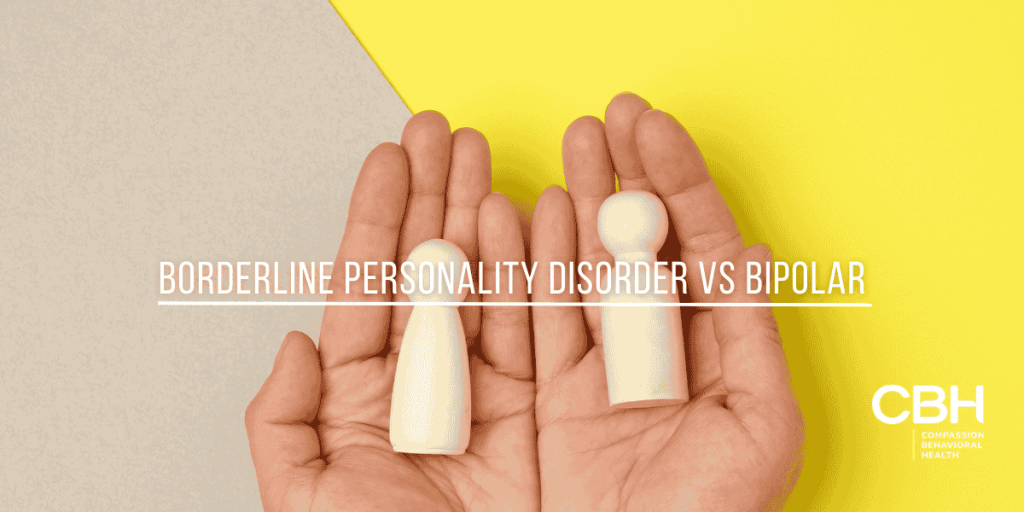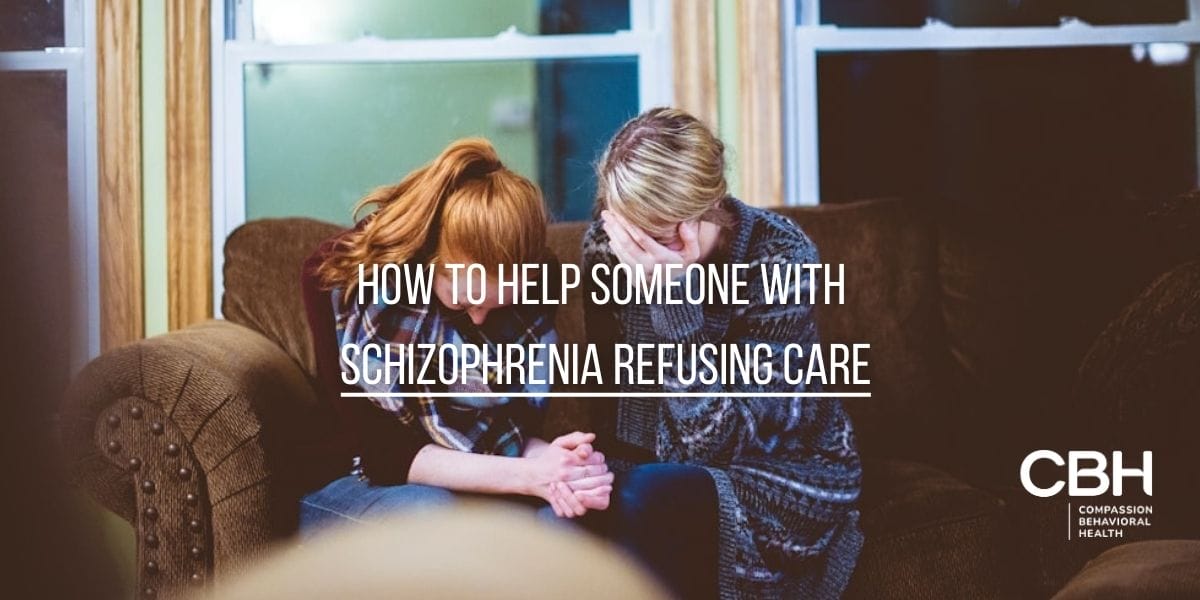Borderline Personality Disorder (BPD) and Bipolar Disorder are two mental health conditions that often get confused with each other. While they share some symptoms and can manifest similarly, understanding their distinct characteristics is crucial for effective diagnosis and treatment.
The main difference is in the nature and duration of mood changes. In Bipolar Disorder, mood shifts are usually episodic, with individuals experiencing clear periods of mania and depression that can persist for days, weeks, or even months.
On the other hand, those with BPD often undergo rapid mood swings, with emotions shifting within hours or even minutes. These fluctuations are frequently triggered by interpersonal conflicts or perceived rejection, whereas bipolar mood changes are generally less affected by external factors.
This article will provide an overview of these disorders, discussing their key differences, similarities, and the implications these have on individuals living with these conditions.
Understanding Mental Health: An Overview
In relation to mental health, awareness and understanding have evolved significantly over the past few decades. Mental health encompasses emotional, psychological, and social well-being and impacts how individuals think, feel, and act. It also affects how we handle stress, relate to others, and make choices. The modern understanding of mental health recognizes that it is not merely the absence of mental illness but a complex interplay of various factors, including biological, environmental, and lifestyle influences. This holistic view encourages a more compassionate approach to mental health, emphasizing the importance of nurturing both mental and physical well-being.
The importance of accurate information cannot be overstated, particularly in a landscape filled with stigma and misunderstanding. People often struggle with diagnosing mental health conditions due to the lack of clear-cut criteria and the overlap of symptoms among various disorders. This is particularly true for Borderline Personality Disorder and Bipolar Disorder. Moreover, the increasing prevalence of mental health issues in our fast-paced society highlights the need for ongoing education and awareness. As more individuals openly share their experiences, the collective understanding of mental health continues to grow, paving the way for more inclusive conversations and better support systems.
The Importance of Accurate Diagnosis
Accurate diagnosis is foundational in mental health treatment. Misdiagnosis can lead to ineffective treatments, worsening mental health, and additional emotional distress. For instance, someone with BPD may be treated with mood stabilizers, typically beneficial for those with bipolar disorder, but may not find relief from their symptoms. This misalignment between diagnosis and treatment can create a cycle of frustration and despair, further complicating the individual’s journey toward recovery.
Recognizing these nuances not only aids in selecting correct treatment paths but also ensures that individuals receive the support and understanding they need. Furthermore, differentiating between these two disorders can help in promoting effective therapy techniques that cater to the specific issues at play. For example, Dialectical Behavior Therapy (DBT) has shown significant effectiveness for individuals with BPD, focusing on emotion regulation and interpersonal effectiveness, while Cognitive Behavioral Therapy (CBT) may be more beneficial for those with bipolar disorder. Tailoring treatment to the individual’s specific needs can lead to more positive outcomes and a greater sense of empowerment in managing their mental health.
Common Misconceptions about Mental Health Disorders
Despite advancements in mental health awareness, several misconceptions persist, which can hinder individuals from seeking help or receiving the proper diagnoses. These misunderstandings often stem from a lack of education and exposure to mental health issues, perpetuating harmful stereotypes that can affect individuals’ willingness to engage with mental health services.
- Mental health disorders are not serious: Many people view mental health issues as less important compared to physical health problems. This invalidation can lead to worsening conditions. In reality, mental health disorders can be just as debilitating as physical ailments, impacting daily functioning and overall quality of life.
- People with mental disorders are violent: This stereotype is not only misleading but harmful, as it contributes to stigma and discrimination. In fact, individuals with mental health issues are more likely to be victims of violence than perpetrators, highlighting the need for a more nuanced understanding of these conditions.
- Therapy is only for severe cases: Many individuals can benefit from therapy, regardless of the severity of their symptoms. Early intervention can often prevent more severe issues from developing, making therapy a valuable resource for anyone facing life’s challenges.
By dispelling these misconceptions, society can foster a more supportive environment for those living with mental health issues. Education and open dialogue are crucial in breaking down barriers and encouraging individuals to seek the help they need. As we continue to challenge these outdated beliefs, we pave the way for a more compassionate and informed approach to mental health care, ultimately benefiting everyone in the community.
Defining Borderline Personality Disorder
Borderline Personality Disorder (BPD) is characterized by patterns of unstable moods, behavior, and relationships. Individuals with BPD often experience intense emotional responses and have difficulty regulating their feelings. Their self-image can fluctuate dramatically, resulting in an unstable sense of self. This disorder can be particularly challenging, as the emotional turmoil experienced can feel overwhelming and unmanageable, leading to a cycle of distress that can be difficult to break.
BPD is often diagnosed in adolescence or early adulthood. Emotional dysregulation and impulsivity can lead to tumultuous relationships, severe anxiety, and suicidal ideations. As such, this disorder presents unique challenges for those struggling with it and impacts their social and occupational functioning. The complexity of BPD means that individuals may also grapple with co-occurring disorders, such as depression, anxiety disorders, or substance use disorders, further complicating their treatment and recovery journey.

Symptoms and Characteristics of BPD
Common symptoms of Borderline Personality Disorder include:
- Intense episodes of anger, depression, and anxiety
- Difficulty maintaining stable relationships
- Fear of abandonment
- Impulsive and self-destructive behaviors, such as substance abuse or reckless driving
- Chronic feelings of emptiness
Individuals with BPD may also exhibit dissociative symptoms, such as feeling disconnected from themselves, particularly during times of stress. This dissociation can manifest as a coping mechanism, allowing individuals to distance themselves from overwhelming emotions or traumatic experiences. Understanding these symptoms is crucial for both those affected and their loved ones, as it can foster a more compassionate approach to interactions and support.
The Impact of BPD on Daily Life
The impact of BPD can be profound, affecting both personal and professional life. Those living with BPD may struggle to maintain consistent employment due to interpersonal conflicts or emotional instability. Relationships may be strained, often oscillating between idealization and devaluation of others. This pattern can create a whirlwind of emotional highs and lows, leaving both the individual and their loved ones feeling confused and hurt.
Additionally, the fear of abandonment can lead to behaviors that push loved ones away, exacerbating feelings of isolation and despair. This dynamic can create a vicious cycle where the individual’s actions, driven by fear and insecurity, lead to the very outcomes they dread. As such, it is crucial to approach treatment and support with empathy and understanding. Therapeutic interventions, such as Dialectical Behavior Therapy (DBT), have shown promise in helping individuals with BPD develop healthier coping mechanisms and improve their emotional regulation, ultimately fostering more stable relationships and a better quality of life.
Unpacking Bipolar Disorder
Bipolar Disorder is a mood disorder that causes extreme mood swings, including emotional highs (mania or hypomania) and lows (depression). These mood swings can affect sleep, energy levels, judgment, and the ability to think clearly, significantly impacting daily functioning. The intensity and duration of these episodes can vary widely, with some individuals experiencing rapid cycling, where they shift between manic and depressive states multiple times within a year, or even within a single day.
Bipolar Disorder can manifest in several forms, including Bipolar I, Bipolar II, and Cyclothymic Disorder, each with unique patterns and severity of symptoms. Diagnosis often occurs during late adolescence or early adulthood, although it can appear at any age. The complexity of the disorder often leads to misdiagnosis, as symptoms can overlap with other mental health conditions such as depression or anxiety disorders, making it essential for individuals to seek comprehensive evaluations from qualified mental health professionals.
Recognizing the Signs of Bipolar Disorder
Common signs of Bipolar Disorder include:
- Manic episodes characterized by increased energy, reduced need for sleep, and racing thoughts
- Depressive episodes marked by feelings of sadness, hopelessness, and a lack of interest in previously enjoyed activities
- Changes in appetite and weight, either increasing or decreasing during mood shifts
- Considerable impairment in daily activities and relationships during both manic and depressive phases
Recognizing these signs can be pivotal in seeking timely intervention and treatment, which can dramatically improve quality of life. Additionally, individuals may exhibit impulsive behaviors during manic phases, such as excessive spending, risky sexual encounters, or engaging in substance abuse, which can further complicate their situation and lead to additional consequences.

Living with Bipolar: What to Expect
Living with bipolar disorder can be challenging, as individuals may experience significant mood fluctuations that disrupt their daily lives. However, with effective treatment plans that include medication, therapy, and lifestyle adjustments, many individuals can manage their symptoms successfully. Medication often involves mood stabilizers, antipsychotics, or antidepressants, tailored to the individual’s specific needs and symptoms. Regular follow-ups with healthcare providers are essential to monitor the effectiveness of the treatment and make necessary adjustments.
Support from family, friends, and mental health professionals plays a crucial role in the recovery process, helping individuals navigate the ups and downs of their moods while fostering resilience and coping strategies. Peer support groups can also provide a sense of community and understanding, allowing individuals to share their experiences and learn from others facing similar challenges. Engaging in regular physical activity, maintaining a structured routine, and practicing mindfulness techniques can further enhance emotional stability and overall well-being.
The Key Differences Between BPD and Bipolar
While both Borderline Personality Disorder and Bipolar Disorder involve mood instability, they differ significantly in several key areas.
Differences in Symptoms and Behaviors
The primary difference lies in the nature and duration of mood changes. In Bipolar Disorder, mood changes are typically episodic, meaning individuals experience distinct periods of mania and depression, which can last for days, weeks, or even months.
Conversely, individuals with BPD often experience rapid shifts in mood, with emotions changing within hours or even minutes. These fluctuations are often triggered by interpersonal conflicts or perceived rejections, while bipolar mood changes are less influenced by external circumstances.

Variations in Treatment Approaches
Another notable difference is found in treatment approaches. Bipolar Disorder is frequently treated with mood stabilizers, antipsychotics, and antidepressants, whereas BPD therapy typically emphasizes dialectical behavior therapy (DBT), cognitive behavioral therapy (CBT), and a strong therapeutic alliance to build emotional regulation skills.
Understanding these treatment variations is crucial. Individuals with BPD often need a different therapeutic approach than those with Bipolar Disorder, highlighting the importance of accurate diagnosis and tailored treatment plans.
The Overlap Between BPD and Bipolar
Though distinct, there exists some overlap between Borderline Personality Disorder and Bipolar Disorder, prompting frequent misunderstandings.
Why These Disorders Are Often Confused
The overlapping symptoms can lead professionals and individuals to misinterpret the disorders. Both may manifest with mood instability, impulsive behaviors, and challenges in interpersonal relationships. Moreover, individuals with either condition may have episodes of disassociation or feelings of emptiness, adding to the complexity of accurate diagnosis.

The Dangers of Misdiagnosis
Misdiagnosis can have serious consequences. For instance, treating BPD with medication intended for bipolar disorder may not address the underlying issues and even exacerbate symptoms. This highlights the necessity for specialized training among mental health professionals and the importance of comprehensive assessments for accurate diagnosis.
In conclusion, while Borderline Personality Disorder and Bipolar Disorder share numerous similarities, their distinctions are crucial for effective treatment. By fostering understanding and awareness about these conditions, both individuals and society can promote better mental health outcomes.
Borderline Personality Disorder and Bipolar Disorder Treatment at CBH

If you or a loved one is navigating the complexities of Borderline Personality Disorder or Bipolar Disorder, remember that you’re not alone. At Compassion Behavioral Health, we understand the nuances of these conditions and are committed to providing personalized mental health and substance use treatment. Our expert team in South Florida is ready to offer the support and guidance necessary for sustainable recovery. Call Us Today to start your journey toward reclaiming your well-being in a compassionate and nurturing environment.



